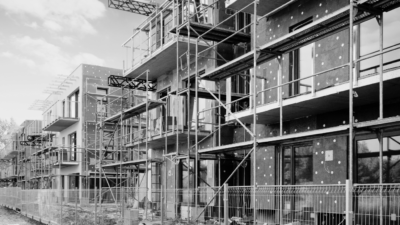The government’s decision to cut stamp duty in last week’s mini budget could help boost new housing delivery by 16% across England, with London seeing the largest potential uplift at 23%, according to new research.
Removing the initial SDLT threshold was just one announcement that came last week with the biggest tax cuts seen in 50 years.
As a result, SDLT will only be payable on property purchases above £250,000, while first-time buyers will only pay the tax on purchases above £425,000, saving the average homebuyer as much as £2,500 and the average first-time buyer up to £8,750.
While another government initiative aimed at fuelling demand is sure to boost buyer numbers and push up house prices, research by Alliance Fund suggests that it may also bring a much needed boost to the level of new homes reaching the market.
Analysis was undertaken on the level of new-build completions seen following the implementation and duration of the original stamp duty holiday, comparing the level of housing delivery over these five quarters to the previous five quarters.
The figures show that between Q3 2020 and Q3 2021, following the introduction of the government’s SDLT holiday, a total of 220,530 new homes were completed across England.
This is 16% more than the 189,440 completed in the five quarters prior to the original stamp duty holiday (Q2 2019 – Q2 2020) – a boost of over 31,000 new homes reaching the market.
The London property market benefitted to the greatest extent, with the capital seeing a 23% boost in new-build completions following the introduction of the stamp duty holiday, equating to 5,560 new homes versus the previous five quarters.
The East Midlands also saw a notable increase, with the level of new homes reaching the market climbing by 20%, as did the North West and North East (+18%).
In fact, every region of England saw a boost to new-build stock levels following the previous reductions to SDLT and while this increase was at its lowest in Yorkshire and the Humber, there was still an 11% increase in new home completions.
CEO of Alliance Fund, Iain Crawford, commented:
“A stamp duty cut is great news for homebuyers but while it’s sure to help cultivate demand for housing, there’s a good chance we may also see a boost to the number of new homes reaching the market.
Of course, the saving itself doesn’t apply to housebuilders, although some do stomach the cost of stamp duty on behalf of their buyers and so there is a marginal benefit to their profit margins in this respect.
However, the far more influential factor is the boost that a stamp duty cut will bring to overall market sentiment and this is very much a wave worth riding for those delivering new-build stock to the market.
We’ve already seen how the stamp duty holiday helped the market bounce back during the pandemic, thanks to a heightened level of buyer numbers with budgets buoyed by a tax saving.
This also spurred an uplift in the number of new-build completions by developers keen to capitalise on such positive market conditions and so we can expect the latest cuts to have a similar influence for both homebuyers and housebuilders alike.”
| Table shows the change in new-build property completions (homes built not sold) over the five quarters when the SDLT holiday was introduced and the five quarters prior to its introduction | ||||
| Location | NB completions during equivalent period before SDLT holiday (Q2, 2019 to Q2, 2020) | NB completions during SDLT holiday period (Q3 2020 to Q3 2021) | Change n | Change % |
| London | 23,760 | 29,320 | 5,560 | 23% |
| East Midlands | 17,740 | 21,240 | 3,500 | 20% |
| North West | 23,910 | 28,260 | 4,350 | 18% |
| North East | 8,820 | 10,380 | 1,560 | 18% |
| West Midlands | 18,340 | 21,490 | 3,150 | 17% |
| South East | 35,150 | 40,450 | 5,300 | 15% |
| South West | 21,680 | 24,680 | 3,000 | 14% |
| East of England | 23,880 | 26,730 | 2,850 | 12% |
| Yorkshire and the Humber | 16,160 | 17,980 | 1,820 | 11% |
| England | 189,440 | 220,530 | 31,090 | 16% |

























Comments